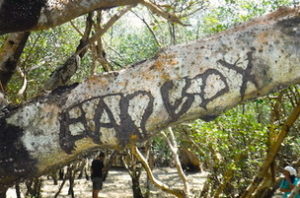Are you a responsible traveller?
 The latest trend in travel is bothersome. The huge volumes of tourists that are going to places that may not be ready for hordes of people are creating serious impacts that may be far reaching than we think. Technology is making these places more vulnerable because they get advertised even before they plan for anything. As a result, tourism has become uncontrolled, and people who live in the communities, including local governments, end up being overwhelmed.
The latest trend in travel is bothersome. The huge volumes of tourists that are going to places that may not be ready for hordes of people are creating serious impacts that may be far reaching than we think. Technology is making these places more vulnerable because they get advertised even before they plan for anything. As a result, tourism has become uncontrolled, and people who live in the communities, including local governments, end up being overwhelmed.
It is therefore important for each person who wish to travel to go through the process of reflection, and consciously think of ways by which ones impact on a destination may be minimized. Here are some tips on how you can become a responsible traveler, and create positive impacts on the places you visit.
The money ONLY gives you the right to experience the place and the culture. Your financial contribution can actually provide an economic incentive for the community members to take care of their natural and cultural assets, such that when you come back with your children or your grandchildren the place will still be the same.
Writing, carving, etching, painting your name on rocks, corals, trees, caves and infrastructure shows how insecure you are that you need to do this to get attention. I have seen graffiti that even includes people’s phone numbers. It is sad that these people may not know of a better way to get friends. This act is simply unacceptable, both to locals and to those who understand how important heritage is. Defacing things that are valuable is very irresponsible. There has to be strict rules and penalties with regards to graffiti, especially in sacred sites and outstanding natural locations. And if you are somebody famous or is a well-known personality, then all the more that you should be more careful with what you do. People tend to emulate people they know and admire, even if they do something irresponsible.3. Do not barter if you are dealing with marginalized communities.
You need to understand that these people also have families to support. They are just like you and me, trying to make a living. If you can afford it, why not pay the right price. There is nothing wrong with positioning a place as a high value destination, especially if it has fragile and beautiful ecosystems that need protection from human activities. The communities have the right to choose which market segment they wish to tap – mass market or ecotourists. High value/low volume strategy is highly recommended if communities wish to have low impact tourism, and still derive significant economic benefit that will be distributed well across the value chain. There is a premium for “handmade” products and ecotourists understand this. So, in case you vaguely understand this concept, it is time to start educating yourself, and perhaps even reflect on whether you have the attitude of a mass tourist, or whether you are a responsible one.
Just think for a moment where your garbage will go. You are on a beautiful island that you consider as paradise. There are no dumpsite or sanitary landfills anywhere since the community is poor and has no proper infrastructure. Heck, they are even burning their own garbage. Imagine 1,000 tourists coming in and bringing all sorts of trash that will never ever degrade (styrofoam containers, plastic spoons, foil wrappers, plastic cups, mylar wrappers, plastic bags and whole lot more). All these 1,000 people, including bloggers start posting pictures of paradise in the internet. Then more people start to come and bring in more garbage. You may start thinking of dumping the trash into the sea where they will not be seen. Don’t be surprised if the locals also start resorting to this because they have no better way to disposing of your trash. Yes, it is your trash, hence you have the responsibility of disposing it responsibly. Take it with you to the mainland where there is garbage collection. And don’t you dare dump it in the streets either.5. Follow rules and regulations and understand why they are being implemented.
One thing that I have learned when I was studying Environmental Education is that EE is important for increased awareness. But for those who have no awareness whatsoever, rules and penalties apply. It is the role of local government to pass ordinances that will control behavior of tourists and investors. People can be selfish and only think of their own benefit. Many Filipinos also do not take rules seriously, because they think that they can always get away with it. After all, some law enforcers can be bribed or “fooled” through “pakiusap”. This attitude has to end, if we want to protect our destinations from human induced destruction. Rules should apply to all, and as they say, “sample! sample! sample!” When people actually get penalized the others start thinking that the local government really means business. And they start to follow.Remember that every human being has a footprint on a daily basis and it is our responsibility to make sure that we are aware of our impacts. It is time for change. We need to find ways by which we can go through each day without leaving destruction in our wake.
Photos are by Chen Reyes-Mencias



